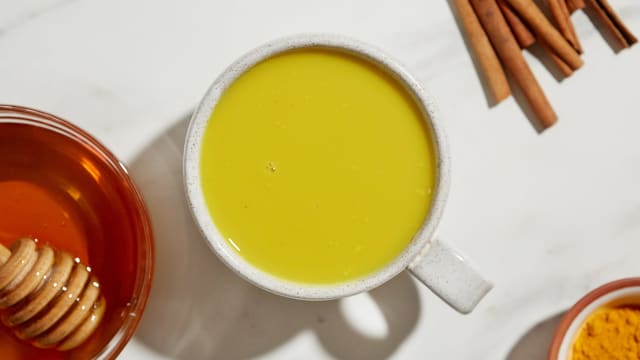Q&A with Karman Meyer

A native of Nashville, Karman Meyer is a registered dietitian and culinary nutrition coach with over fifteen years of experience in the nutrition and food industry. A “travel-obsessed food enthusiast,” she aligns her knowledge of nutrition with her love for healthy cooking and sensible eating.
As the founder of the NourishWell Network and recipe creator behind The Nutrition Adventure website, Karman wants to help people enjoy food, “not fear it.” She shares easy recipes that encourage people to feel confident about cooking delicious and nutritious food at home.
Meyer constantly examines current food trends and nutritional wisdom to see what works, and what can be adapted to people’s busy lifestyles through workshops and wellness webinars. Her first book, Eat to Sleep, delves into the science behind sleep and how it impacts various aspects of our lives, including our appetite, metabolism, and overall health.
Meyer provides practical tips and strategies for improving sleep quality, including recommendations for foods to eat, and avoid, before bedtime. Eat to Sleep aims to help readers understand the importance of sleep and how it can be optimized through proper nutrition and lifestyle habits. Her next book, The Everything DASH Diet Meal Prep Cookbook, expands on her work with 200 practical, healthy recipes.
Roundglass Food: As a nutritionist why did you think it important to take a deep dive into the connections between sleep and food?
Karman Meyer: Sleep is the foundation of good health, but what we eat can have a positive or negative impact on the quality of sleep we get. According to the 2015-2020 Dietary Guidelines for Americans, the most concerning under-consumed nutrients for the majority of Americans are calcium, potassium, dietary fiber, and vitamin D. Three out of four of those nutrients, and the foods they're commonly found in, have an important role in getting a good night's sleep. These nutrient deficiencies need to be addressed for overall better health.
RG Food: Your book Eat to Sleep was released in 2019. What sort of responses and impact has it made over the years?
KM: Since 2019, I've read more and more articles on the topic of nutrition for improved sleep. And sleep itself is finally getting the recognition it deserves for being a critical piece of health. The American Heart Association has even recently added sleep as one of the eight essential components of optimal cardiovascular health. It's been exciting to see this area of research and discussion grow, and I expect we'll see much more interest and understanding of how food can improve sleep.
RG: You talk about “sleepy foods” in your books. Which are your favorites and why?
KM: One of my first recommendations to those struggling with sleep, and a beverage I enjoy often, is tart cherry juice for a natural source of melatonin. It has been researched specifically for its effects on sleep and been found to help prolong sleep by close to 80 minutes, even for those suffering from insomnia!
Another favorite "sleepy food" that I recommend in the book is pumpkin seeds because they're a good source of magnesium, which is essential for stress reduction, reducing inflammation, and for good sleep. Shelled pumpkin seeds can easily be added to oatmeal, yogurt, salads, or used as a soup topping. They're so easy to add to the daily routine, which is one reason why I love them.
RG: How does sleep impact immunity, and how can we take advantage of this through nutrition and diet?
KM: Sleep helps strengthen the immune system, and studies have shown that without adequate sleep, people are more likely to get sick after being exposed to a virus such as the common cold. We should aim for 7-9 hours of sleep each night to support the immune system. When it comes to nutrition to support the immune system, focus on simple, wholesome foods and those that are rich in vitamin C and other immune-benefitting nutrients like zinc, vitamin D, vitamin A, and selenium.
RG: What’s a mindful practice around food that you follow? And why?
KM: A mindful practice I follow is listening to my hunger cues in the evening and noticing whether or not I would benefit from having a snack before bed. Having a light snack before going to bed can help prevent blood sugar dips in the night, which can cause a sudden release of adrenaline and cortisol that jolts you awake. It's also difficult to go back to sleep if you wake up hungry in the middle of the night until you get something to snack on! I try to avoid that, and instead eat a small bowl of popcorn or have a yogurt with some fruit about an hour before going to bed.
RG: What’s an herb (or elixir, or fruit, or tea) that you associate with healing and sleep?
KM: Chamomile is one that comes to mind for healing and sleep, as it has been used for centuries to calm anxiety, relieve digestive issues, and to help with sleep. This is thanks to apigenin, an antioxidant that binds to benzodiazepine receptors in the brain to create a sedative effect, allowing the body to reach a deeper state of sleep.
RG: What’s your main nutrition concern, and how do you address it?
KM: I strive for 8 hours of sleep every night to give my body the time it needs to reach the deep, restorative stages of sleep and to get the most health benefits from it. Keeping a consistent sleep routine is important, so I don't let the weekends disrupt my sleep schedule if I can help it. Since food can play a role in how well we sleep, I try to keep certain practices in mind from day to day, like cutting off caffeine intake 10 hours before bed, avoiding big, heavy meals at dinner, and ensuring I get the nutrients the body needs to help me sleep well.
Key Takeaways
- Meyer's "sleepy foods" aid restorative sleep.
- Healthy sleep habits improve immunity.
- Good sleep is vital for wellbeing.




